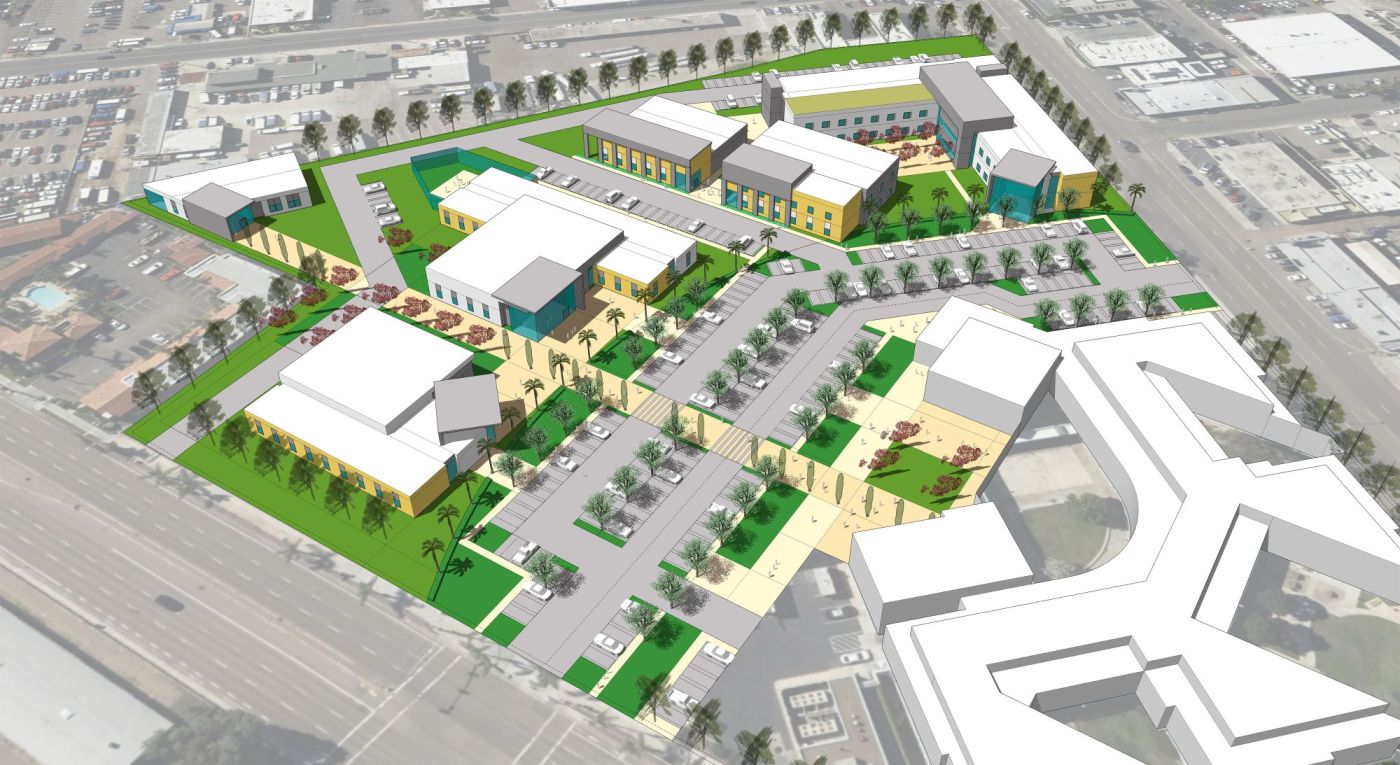Health
San Diego County Proposes $210 Million Mental Health Campus

San Diego County has unveiled plans for a new mental health campus aimed at providing comprehensive care to address early symptoms before they escalate into crises. The proposal, approved by the county board of supervisors, seeks a $100 million grant from the state under Proposition 1 to fund a facility capable of serving up to 20,000 individuals annually.
Located on Rosecrans Street adjacent to the San Diego County Psychiatric Hospital, the new “behavioral health wellness campus” will replace a former health services complex that has been vacant since various departments relocated to a different facility. The project aims to deliver a more holistic approach to mental health care in a county that, like many others in the United States, faces an increasing demand for services.
San Diego County has struggled with a shortage of available beds in hospital settings, leading to prolonged emergency department stays for patients in crisis. While initial efforts have focused on immediate interventions, experts advocate for a long-term strategy that ensures continuous care rather than reactive responses to severe symptoms.
As part of the proposal, the total budget for the campus has increased from $150 million to $210 million, now reflecting the estimated $27 million value of the county-owned land. The county plans to create a multi-use complex that includes a crisis stabilization unit, a mental health rehabilitation center, a social rehabilitation facility, an adult residential substance use disorder treatment facility, and an outpatient community mental health clinic.
If successful in securing the grant, this facility would be the first of its kind in San Diego County, integrating multiple types of mental health services in one location. According to Karen Larsen, executive director of the Steinberg Institute, similar models exist in only two other locations in California, one in Riverside and another in Orange County.
“The state has emphasized the importance of these campus models, which provide a one-stop shop for individuals with both mental health and substance use disorders,” Larsen stated. This integrated approach is designed to facilitate transitions between different levels of care, helping to prevent individuals from falling through the cracks during their treatment journey.
The proposed campus will accommodate a range of services tailored to varying degrees of mental health needs. Crisis centers, for instance, will allow individuals experiencing distress to relax in comfortable settings for up to 24 hours, where trained clinicians will assess their needs for inpatient care or outpatient referrals. In cases requiring long-term residential treatment, the mental health rehabilitation center will provide comprehensive rehabilitation services, including therapy and medication management.
For those who do not require inpatient treatment, the social rehabilitation facility will operate 24 hours and be staffed by peers who have overcome similar challenges, supplemented by clinical staff for short-term support. Additionally, the substance use disorder treatment facility will offer medically monitored intensive inpatient services, overseen by healthcare professionals, focusing on withdrawal management and relapse prevention.
The outpatient mental health clinic will provide accessible care, including mental health screenings and various types of therapy and medication management. This approach aligns with the county’s previously adopted “optimal care pathways” plan, which emphasizes ongoing engagement in treatment and the importance of regular check-ins, even with non-licensed personnel.
County supervisor Terra Lawson-Remer has been a strong advocate for the new campus, arguing that co-locating mental health and substance abuse treatment is essential. “The separation of these services makes little sense as these conditions often co-occur,” she explained. Lawson-Remer believes the wellness campus will enhance engagement in treatment and improve overall outcomes for patients.
The county’s proposal faces significant competition for the Proposition 1 funding, which will allocate over $800 million for unmet mental health needs following the first round of a $4.4 billion statewide behavioral health infrastructure bond approved by voters in March 2024. While the $100 million request would not fully cover the campus’s costs, successful grant approval could lead to a broader financial plan involving private partnerships to secure additional funding.
When asked about alternatives if the grant is not awarded, Lawson-Remer expressed cautious optimism. “I wouldn’t dismiss the possibility of other funding sources, though I cannot define what plan B might look like at this moment,” she noted.
In a related development, Palomar Health in North County is also seeking round two funding, with plans for a 120-bed behavioral health specialty hospital at the Palomar Medical Center Escondido, indicating a regional push towards enhancing mental health infrastructure.
-

 Business1 week ago
Business1 week agoIconic Sand Dollar Social Club Listed for $3 Million in Folly Beach
-

 Politics1 week ago
Politics1 week agoAfghan Refugee Detained by ICE After Asylum Hearing in New York
-

 Health1 week ago
Health1 week agoPeptilogics Secures $78 Million to Combat Prosthetic Joint Infections
-

 Science1 week ago
Science1 week agoResearchers Achieve Fastest Genome Sequencing in Under Four Hours
-

 Lifestyle1 week ago
Lifestyle1 week agoJump for Good: San Clemente Pier Fundraiser Allows Legal Leaps
-

 Health1 week ago
Health1 week agoResearcher Uncovers Zika Virus Pathway to Placenta Using Nanotubes
-

 World1 week ago
World1 week agoUS Passport Ranks Drop Out of Top 10 for First Time Ever
-

 Business1 week ago
Business1 week agoSan Jose High-Rise Faces Foreclosure Over $182.5 Million Loan
-

 World1 week ago
World1 week agoRegional Pilots’ Salaries Surge to Six Figures in 2025
-

 Entertainment1 week ago
Entertainment1 week agoJennifer Lopez Addresses A-Rod Split in Candid Interview
-

 Top Stories1 week ago
Top Stories1 week agoChicago Symphony Orchestra Dazzles with Berlioz Under Mäkelä
-

 Science1 week ago
Science1 week agoMars Observed: Detailed Imaging Reveals Dust Avalanche Dynamics








